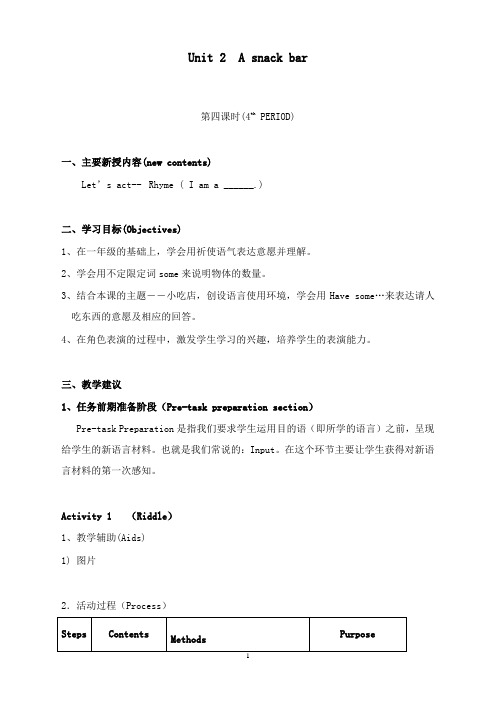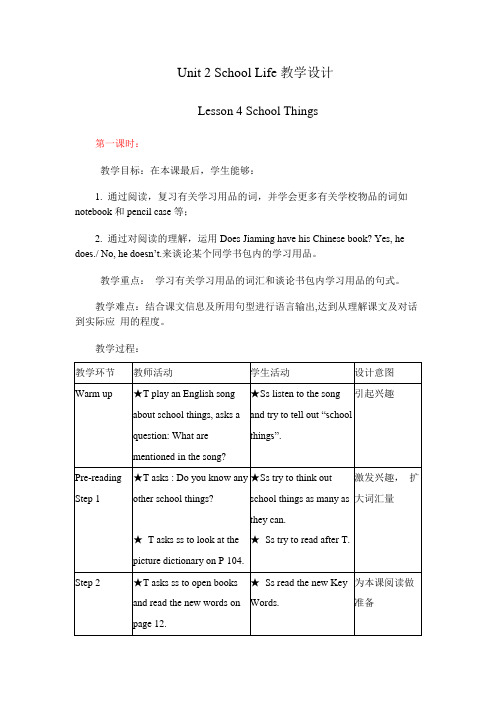U2第四课时2
- 格式:doc
- 大小:35.00 KB
- 文档页数:2

Consolidation Exercises 8下Unit 2一、根据句意和汉语提示写出单词,完成句子。
1. As we all know, light travels at a very high (速度).2. My father has gone to Beijing on (公事). He won’t be back until next Friday.3. We carefully watched every (细节)of his actions.4. You can take a direct (航班)to Chengdu. It’s much faster.5. People could play (室内的)sports whatever the weather is like.二、根据句意用所给单词的适当形式填空。
1. If you go to Lakeside Park in the early morning, you can see many old(couple) dancing.2. Although he has been (die) for 10 years, he is still remembered by many people.3. They usually visit their (relative) on weekends and buy them many gifts.4. The summer holiday is coming. Have you ever considered (travel) abroad?5. The couple got (marry) when they graduated from college five years ago.三、单项选择。
1. (2016河南)—Are you going out with Jade tonight?—That’s my . Mind your own!A. offerB. businessC. questionD. chance2. (2016朝阳)—I love the beach in summer.—Yes, it good to swim in the cool water.A. tastesB. looksC.smellsD. feels3. (2016德阳)—All the students attended the meeting Jenny. Why? —Because she was ill.A. besideB. exceptC. besidesD. instead4. —Excuse me, could you tell me how I can get to the Wild Park?—I’m going to drive there, and I can give you a .A. guideB. reportC. speechD. ride5. —Will Susan come to the party?—I’m not sure. She didn’t give me a reply.A. rightB. directC. goodD. special6. They didn’t continue climbing the because of the bad weather.A. beachB. mountainC. riverD. street7. —How was your summer camp, Ben?—It was . I had a great time there.A. fantasticB. BoringC. strangeD. terrible8. This Minions《小黄人》can make you laugh all the time.A. activityB. ShowC. cartoonD. programme9. The cakes in this shop are so that plenty of people come to buy them every day.A. terribleB. deliciousC. helpfulD. useful10. The Korean actor called Song Joong Ki has been famous in China 2016.A. sinceB. forC. atD. in11. Could you pick me up at the ? My plane arrives at 10:00 pm.A. cinemaB. airportC. theaterD. school12. —If someone sends you a gift, make a of thanking him the next time you meet him. —I will.A. decisionB. JokeC. noteD. point13. I haven’t seen my grandma for a month, and Iher so much.A. rememberB. wishC. missD. forget14. —Can you tell me where the hospital is?—the street. You can find it easily.A. At the endB. In the endC. By the end ofD. At the end of15. —Will Tom come to the concert this evening?—No. He America.A. has been toB. has gone toC. has been inD. has come to四、阅读理解(2016徐州一检)。

Unit 2 Meet My Family
Lesson 4 Theme Reading
I. Material analysis
内容解读:本部分为主篇阅读部分,帮助学生运用本单元所学的思维技能和阅读策略开展主题阅读。
首先学生通过Prepare Work谈论家庭时光,为后续主题阅读作铺垫。
学生通过阅读主语篇,回扣本单元阅读策略,找出主题句,通过阅读文本,判断信息正误,理解主语篇重点信息,根据文本第二段的内容绘制该段落的思维导图,并回扣本单元的思维技能。
最后通过小组活动中讨论图片、利用图片复述文本的活动,帮助学生落实思维技能和阅读策略,掌握主语篇中的内容。
本部分共分为5个活动。
II. Teaching aims
1.用“略读”这一阅读策略和组织观点的思维技能获取文本的主旨大意和关键信息;
2.依据所学语言知识,结合思维导图介绍康康的家人和活动;
体会参与家庭时光的快乐,树立良好的家庭价值观。
III. Teaching procedures
IV. Blackboard design。

Unit 2 A snack bar第四课时(4th PERIOD)一、主要新授内容(new contents)Let’s act-- Rhyme ( I am a ______.)二、学习目标(Objectives)1、在一年级的基础上,学会用祈使语气表达意愿并理解。
2、学会用不定限定词some来说明物体的数量。
3、结合本课的主题――小吃店,创设语言使用环境,学会用Have some…来表达请人吃东西的意愿及相应的回答。
4、在角色表演的过程中,激发学生学习的兴趣,培养学生的表演能力。
三、教学建议1、任务前期准备阶段(Pre-task preparation section)Pre-task Preparation是指我们要求学生运用目的语(即所学的语言)之前,呈现给学生的新语言材料。
也就是我们常说的:Input。
在这个环节主要让学生获得对新语言材料的第一次感知。
Activity 1 (Riddle)1、教学辅助(Aids)1) 图片2.活动过程(Process)Activity 2 (Look and say)1、教学辅助(Aids)1)电脑(2A-U2-15)2)屏幕2.活动过程(Process)Activity 3 (Guessing)1、教学辅助(Aids)1)一小袋饼干2)一小袋糖果2.活动过程(Process)2、任务中期实施阶段(While-task procedure section)While-task Procedure,这是指语言技能的习得过程。
其中分为机械性操练和意义性操练两部分。
机械性操练可以让学生准确地模仿、复说新授的语言,让他们经过从模仿到识记的过程,使新知识由感知、理解、模仿直到储存。
由于本教时新授内容有词汇也有句子而且都在两个以上,在这个教学阶段也可以设计新授知识的二次或多次导入,并根据语言训练的需要设计相应的机械性操练和意义性操练。
在这种情况下,建议每项Activity形式尽可能不同,时间不要长,一个活动紧接着一个活动,容易抓住学生的注意力,维持学习兴趣。

Module 4 Unit 2(20分钟50分)Ⅰ. 根据句意及汉语提示完成单词(10分)1. This kind of computer is(生产) in China.2. It is well-known that paper was(创造) about 2, 000 years ago in China.3. (知识) is power, and time is money.4. Does the illness(散播) quickly in the countryside or in the city?5. This kind of cloth is made of(棉花).Ⅱ. 用所给词的适当形式填空(10分)1. Printing is one of the most important(invent) in the world.2. The(introduce) of the Internet makes our life easier.3. At the(begin) of the new term, we can meet a lot of new friends.4. They are learning(make) dumplings in a Chinese restaurant.5. Can the paper(write) on?Ⅲ. 单项选择(10分)1. Many foreigners prefer things that are made in China.A. with handB. in handsC. by handsD. by hand2. I will go home to watch TV rather than this film.A. to seeB. seeingC. seeD. will see3. —The T-shirt feels very comfortable. What’s it made?—Silk, I think.A. ofB. inC. fromD. by4. Please compare this book that one. And find out the differences between them.A. toB. withC. onD. in5. Little Jerry gets up early he could get there on time.A. in order toB. so thatC. so as toD. such thatⅣ. 完成句子(10分)1. 不要什么事情都一起做, 要一次做一点。

Unit 2 School Life教学设计
Lesson 4 School Things
第一课时:
教学目标:在本课最后,学生能够:
1. 通过阅读,复习有关学习用品的词,并学会更多有关学校物品的词如notebook和pencil case等;
2. 通过对阅读的理解,运用Does Jiaming have his Chinese book? Yes, he does./ No, he doesn’t.来谈论某个同学书包内的学习用品。
教学重点:学习有关学习用品的词汇和谈论书包内学习用品的句式。
教学难点:结合课文信息及所用句型进行语言输出,达到从理解课文及对话到实际应用的程度。
教学过程:
第二课时:
教学目标:在本课最后,学生能够:
1. 通过完成表格,发现总结have ,has, do , don’t, does和doesn’t的用法;
2. 通过对话练习,熟练掌握Do I/you/we/they have…?和Does he/she/it have…?一般疑问句以及肯定和否定回答;
3. 运用have和has的肯定句和否定句来向全班介绍自己书包和同桌书包分别有什么,没有什么学习用品。
教学重点:
Have/has 的用法以及含有have/has的肯定句,否定句,一般疑问句和特殊疑问句的构成。
教学难点:
结合实际,熟练运用Do 和Does开头的一般疑问句来询问和回答某人有某样学习用品。
教学过程:。

Unit 2 Section B (2a -2e)Ⅰ.根据句意及汉语提示完成句子1.Let’s help that ______(失明的) man. He’s walking across the road.2.Here is a ______(信) for you.3.Listen! Someone is knocking at the ______(门).4.After six months of ________(训练), the children got stronger than before.5.He has _________(困难) finding the way to the hospital.6.[2021遂宁] Finally they ___________(理解) the meaning of life after the accident last year.7.Scott, can you ______(打开) the window? It’s a little hot.8.He is _____ (聋的) and can’t hear anything.9.The man is _________ (扛) a heavy box on his back.10.Do you think the air pollution will ________(改变) the weather?Ⅱ.用所给单词的适当形式填空11.We should do something to help those _________(able) people like the blind or the deaf.12.[2021百色] We can see many ___________(different) in our villages which are getting far more beautiful.13.Can you imagine _______(live) alone on a lonely island?14.Yesterday I met an old friend of ______ (I) on the street.15.[2020呼和浩特] People who are warm-hearted set good examples to society because they pass on their _________(kind) to people around them.Ⅲ.根据汉语意思完成句子16.你能想象人工智能将在很多领域取代人类吗?_____ _____ ________ that AI will take the place of human beings in many fields?17.我们想建立一个组织来帮助贫困的孩子。
Unit 2 How often do you exercise教学目标:一、知识目标Words and expressions: maybe, least, junk food, coffee, health, help with, How often do you go to the movies I go to the movies maybe once a month. How often does he watch TV He hardly ever watches TV.Do you go shopping No, I never go shopping.How often do they stay up lateDoes Sue eat a healthy breakfastHe plays at least twice a week.She says it’s good for my health.How many hours do you sleep every night二、能力目标掌握一些频率副词和词组的用法三、情感目标:通过讨论生活细节活动的频率,让学生形成健康的生活理念形成积极向上的生活观。
四、语法难点:频率副词的用法。
教学过程Step1 Revision1.Revise the content learnt in last period and have a dictation.2.Revise the Adverbs of Frequency.3.Step2 New words:1. Learn the new words: maybe, least, junk food, coffee, health2.Explain the use of them.Step3 Grammar FocusLet the students read the sentences in the box and make sure they understand them. Pay attention to the use of the following sentences:How often do you go to the movies I go to the movies maybe once a month. How often does he watch TV He hardly ever watches TV.Do you go shopping No, I never go shopping.Step4 3a1.Let the students fill in the blanks in the box ,paying attention to the useof “stay up late, at least, twice a week〞2.Check the answers.Step5 3b Make up questions like 3a, and then ask and answer with his/ her partner. Step6 3c Practice1.Let the students ask their group questions about how to improve their English,fill in the chart.2.Tell the class their results.Step 7 Section B 1a 1bPractice the conversation with Adverbs of Frequency on eating habits.Step 8 Listening 1c 1dRead the listening material first and then listen twice for each part. Check the answers.Step 9 Test1.你多长时间看次电影?我可能一个月一次。
人教版必修一·U2第四课时随堂训练(解析版)一、根据要求完成句子(共6小题)1.I requested that nobody _________________________ (上课迟到) tomorrow.2.The president attended the meeting ________________________ (应我们的要求).3.All the students are requested ________________________ (attend) the annual school celebration.4.What’s your opinion of Mr Li’s request that we ________________________ (spend) half an hour reading English aloud every morning?5.It ________________________ (request) that all the visitors ________________________ (not take) pictures of the exhibitions.6.I sincerely hope that ________________________(你特别考虑一下我们的要求).【答案与解析】1.request 加从句,句子用虚拟语气should do,迟到用be late for。
故填:(should) be late for class2.应某人的要求:at one’s request。
故填:at our request / at the request of us3. 要求某人做某事:request sb to do,变被动为be requested to do。
故填:to attend4. request 加同位语从句,句子用虚拟语气我们花费用we should spend。
Unit 2课题Unit 2 Section A (1a—2d) 课型听说课教学目标知识与能力 New words and expressions过程与方法 listen, answer, speak, pairwork情感态度与价值观 We should take pleasure in helping others教学重点clean u p cheer up give/hand out come up with put off making a planput up教学难点动词短语,动词不定式,使用情态动词表示“提议〞、“建议〞、“请求〞教学策略泛听与精听相结合,创设情境与对话操练相结合教学方法对话法、合作法、任务型教学法教学反思目标达成课堂生成教学效果改良措施一、根底知识梳理1、单词cheer v.欢呼,喝彩sign n. 标志;信号notice n. 通知,通告,注意 v.注意到;意识到lonely adj.孤独的,寂寞的2、短语清扫(或去除)干净 clean up (使)变得更快乐;振奋cheer up 分发;散发give/hand out 想出;提出come up with 推迟/延迟制订方案put off making a plan 建造;举起;张贴put up 做些公告牌make some notices 参加……选拔;试用 try out (for) 为…工作;为…. 效力 work for打 ;征召 call up .清洁日 Clean-Up Day帮助解决困难 help out with sth曾经… 过去… used to (do sth.)关心;照顾 care for3、句式1.我想帮助无家可归的人。
I’d like to help homeless people.2.她决定参加一个课外阅读工程的志愿者选拔。
She decided to try out for a volunteer after-school reading program.3.他相信这些能帮助他找到将来理想的工作。
Unit 2 What time do you go to school?第四课时Section B (2a—Self Check)学习目标:学习时刻的表达方式和一般现在时学习重难点:1What time 和When引导的特殊疑问句2.学习频率副词在句中的运用课前预习案I. 英汉互译1. unhealthy habits ________2. on weekends __________3. taste good _____________4. 有时______________5. 从….到… _____________6. 半个小时____________7. 早早地上床睡觉___________8. 许多,大量__________ II. 根据汉语完成句子1. 我没有很多时间用早餐,所以我通常吃的快。
I don’t have ________ _________ for breakfast, __________ I usually eat very ________.2. 我要么做运动,要么看电视。
I __________ play sports __________ watch TV.3. 读书对我们有益。
Reading is good ___________ ___________.课中训练案I. 语法聚焦一般现在时中动词第三人称单数形式的变化规则在一般现在时的肯定句中,当主语为第三人称单数时,动词变化主要体现在词尾,其规则如下:1)一般情况下,直接在动词词尾加s. 例如:play- plays, like-likes2) 以s, x, sh, ch, o结尾的动词后加es. 例如:brush- brushes, watch- watches3) 以辅音字母加y结尾的动词,将y变i加es. 如:study- studies, try- tries, 元音字母+y结尾的直接加s,如plays.4) 特殊的变化:have---hasII. 根据句意用所给动词的适当形式填空。
1. The young man usually ______________ his clothes on Sundays. (wash)2. Linda and Jim often ___________ homework in the evening. (do)3. Sometimes we _______ football in the afternoon. (play)4. Li Lei __________ TV once a week. (watch)5.Jerry (go) to school at seven o’clock.6.Little Tommy (brush) his (tooth) every morning.7.Mr.White usually (have) a shower after lunch.8. He usually ___________ (swim) or _________ (take) a walk.课堂检测案I. 用所给词的适当形式填空1. She likes ____________ (eat) ice-cream.2. I usually do _________ (I) homework.3. Either my parents or my brother ___________ (watch) TV every night.4. Tony often ___________ (brush) teeth.5. Lots of ___________ (vegetable) are on the table.6. That is a ____________ (health) lifestyle.7. Jim often runs after __________ (get) up.8. We need ______________ (exercise) every day.9. They __________ never late for the __________ (one) class in the morning.10. That’s a ___________ (fun) time to go to bed.II. 单项选择( )1. The movie is __________. I want to see it again.A. boringB. funnyC. sadD. scary( )2. Mary has time ___________ sports on weekend.A. playB. playsC. to playD. playing( )3. Either you or your sister ___________ the room every day.A. cleansB. cleanC. to cleanD. cleaning( ) 4 The food here smells good, but what does it ___________ like? (安徽中考)A. tasteB. seeC. feelD. Touch( )5. ---- ________ do you go to school? ----I often go to school ________ 7:30 pm.A. What time, onB. What time, atC. When, in( )6. ________ your friend _________ homework?A. Does, doesB. Do, doesC. Does, do( )7. I go to ________ work after _______ breakfast every day.A. /,theB. /,/C. the,a( )8. ---- When do you do__________ homework?---- I often do ________ homework in the evening.A. you, meB. your, myC. your, me( )9. 8:30 am means (意思是)___________.A. half past eight in the morningB. half to eight in the morningC. half past eight in the afternoon根据汉语提示,写出句子。
1. 我通常在四点十五分从学校回到家。
_______________________________ ______________________2. _______________________________3. ______________________________ ___________4. _______________________________5. 我弟弟从未上学迟到过。
________________________________6. ________________________________三、补全对话。
A: What time does your son usually get up?B: He usually _____ up at half past six. Then he always exercises ____ 6:30 __ 7:00.A: When does he usually have breakfast?B: He _____ a shower at 7:10, he ____ breakfast at 7:30. Then he goes to school at 8:00.A: Great! I think he has a healthy ____.B: Y es. And he usually ___ home ___ school at five. He ___ his homework first. Then he plays sports ___ half an hour. A: When does he go to bed?B: At half past nine.四、根据汉语提示完成句子。
1. 我没有时间吃早餐,因此我通常吃得很快。
I don’t have _____ ____ for breakfast, so I usually ___ ____ ______.2. 他在晚上或者看电视或者玩电脑游戏。
He ______ watch TV __ play computer games __ the ________.3. 午餐,她吃很多的水果和蔬菜。
For _____, she ____ ____ ___ fruit and vegetables.4. 冰淇淋尝起来很好,但对她的健康不好。
Ice-cream ____ _____, but it’s not _____ ____ her.5. 在晚上,我通常游泳或散步。
In the _______, I usually ______ or ____ _________ ________.6. 他有时候会打半个小时的篮球。
He _________ plays basketball ______ an hour.。